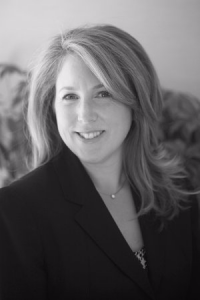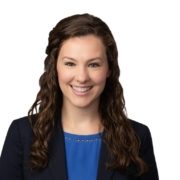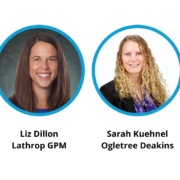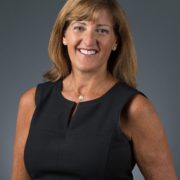Spotlight on Flex – Wendy Sugg
The Spotlight on Flex showcases professionals from member organizations who exemplify personal and professional success while working a flexible schedule. Their stories illustrate the long-term benefits that flexible schedules offer to both individuals and organizations.
This month, we are pleased to share insights from Wendy Sugg, Counsel, Troutman Sanders (Orange County, CA).
 Diversity & Flexibility Alliance: How have you made flexibility a priority and a success through your schedule?
Diversity & Flexibility Alliance: How have you made flexibility a priority and a success through your schedule?
Wendy Sugg: I started working for a firm in New York, followed by a two-year clerkship for the Southern District of NY. There wasn’t a lot of flexibility in my schedule while in New York, but it was great training. I always knew I would come back to California – the idea of having to rent a car to get out of town was insane to me! I moved back here in 2003 and was a litigator at my first California firm for eight years. While there, I started doing a lot of employment litigation, and as I became more senior, I started thinking about specializing. It was a natural fit to stick with employment matters. I started looking for a full-service firm where I could continue to specialize, build a book of business, and have other departments to help with that too.
I found another firm that checked these boxes, and a year and a half later, I had my son. At the time, he had weekly medical appointments, and I wanted one day a week off in order to accommodate his needs and focus on his care. It was a great arrangement with my previous firm, and I started to build a good network and book of business. I was formally on a 75 percent, reduced hours schedule and came into the office four days a week.
I came to Troutman Sanders three years ago; they had no employment litigators or employment practice on the West Coast. It was another great opportunity to build my expertise and practice here. I was clear during the interview process that I wanted to continue working at a reduced hours schedule (now at 80 percent) because my son had just turned two, and we were still taking care of his medical needs. I felt comfortable asking for flexibility right from the start because it was what I needed. The firm had no issues with this, matched my salary, and brought me on as a direct lateral hire. In other words, instead of focusing on my schedule, we focused on developing a business and marketing plan. There wasn’t an employment attorney on board yet, and the firm had immediate business needs such as counseling clients and their employees during transition periods (such as post-merger or acquisitions).
The firm has never pressured me to go full time. I typically leave the office before 6 pm, but I log back on when I need to. Now I come into the office five days a week, but on Fridays I try to leave by 3 pm. I use Fridays to focus on client development or to focus on me. I have the flexibility to do the work wherever I need to because at the end of the day, the work is getting done. It would be a problem if I didn’t have this type of flexibility because I’ve become so used to it. I love what I do and the area of law I specialize in; I get to be involved from the early stages with a client and help them set up policies and procedures to avoid employment/labor issues down the road. This is a type of work I can do anywhere, which helps in maintaining control over my schedule.
DFA: How have the firm and clients contributed to your flex success? How has flexibility contributed to your business development and sustainability of working at a firm?
WS: The firm has been great, and my clients don’t really know I work a reduced hours schedule. My practice area tends to be 50/50 male/female, but most of my clients are female. We all have shared family responsibilities, and there’s lots of understanding between us. I’ve set a tone with my clients that I’m responsive to their needs, and we respect each other’s time out of the office. If there is a request, I ask right away “when do you need this?” The more you communicate about a deadline, the more you can plan and schedule to make sure you’re meeting their needs.
I don’t know if I would do anything different if I were working full time because my goal and focus has always been on client development. It’s definitely a benefit that I can mentally note that Fridays are not heavy days, and I can use that day to meet with clients or make a connection. Or I can use that day to write a quick post for the firm’s labor and employment blog about any new developments so my name is out there internally and externally. It’s great not being tied down to the Orange County office; some days I work in the San Diego office and continue to build internal relationships there too.
DFA: Looking back, what would you tell your first year associate self? Would you do anything differently?
WS: Know that opposing counsel’s attitude problems are not your problems. You can’t take things personally, and you don’t know what other people are going through outside of the office. It took me awhile to step back and say, “I know what I’m doing, and I’m comfortable with what I’m doing.”
You also have to advocate for yourself all of the time. Don’t assume people are going to do this for you. At my one of my former firms, I brought in a large new client while I was an associate and didn’t receive credit for it. In fact, during my review, I was told I needed to focus on more client development because the reviewing committee had no idea about my role with bringing in the client. This was a good learning experience, and it taught me to be more vocal about my achievements. Now when a new matter comes in, I’m very clear about how and where credit is going to be given.
Don’t let an opportunity to be vocal about your accomplishments go by. It’s not tooting your own horn; it’s important to do it. We often think of ourselves as part of a team, and everyone on the team has the same goals – to do the best work for the client and firm. But you have to realize that everyone still has their own agenda. You are not the first item on other people’s agendas.
DFA: How do you pay it forward, and how do you recharge your batteries?
WS: I’m pretty open with associates about my schedule, and people ask me questions on how they should approach their own holistic flex. I try to be an active mentor with associates as they are navigating their lives. I’ve run the gauntlet on the East Coast, West Coast, clerkships, law firms, etc., so I can offer a wide range of perspectives.
To recharge, the thing I do the most is hiking. I live close to the ocean and trails and am able to get away for an hour for a mental break. Go climb a hill – it’s great! It clears your mind; you can’t do anything else, and you can’t look at your phone. I love it! I feel really recharged afterwards.
Also, literally being the only labor and employment counsel on the West Coast gives me a sense of calm, though that adds pressure when it’s busy. I know my practice area is valued and I’m respected. It takes a lot of juggling to balance my personal life with my practice, but it’s why flexibility really allows me to have a successful practice.
If you are a professional working a flexible schedule and would like to share your story in an upcoming Spotlight on Flex, contact Eliza Musallam.






